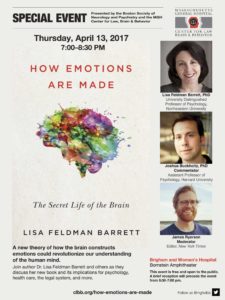Part of the ongoing coverage of Dr. Lisa Feldman Barrett’s new book, How Emotions Are Made: The Secret Life of the Brain.
CLBB’s Dr. Lisa Feldman Barrett is interviewed by NPR after being featured on the scientific podcast, Invisibilia. She discusses the theory of emotions presented in her latest book, How Emotions Are Made, noting, “[the “classical view” of emotions] matches the way that many of us experience emotion, as if something’s happening outside of our control. But the problem with this set of ideas is that the data don’t support them. There’s a lot of evidence which challenges this view from every domain of science that’s ever studied it.” Continue reading »




